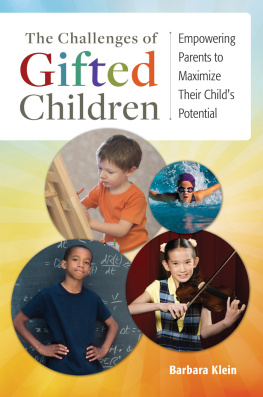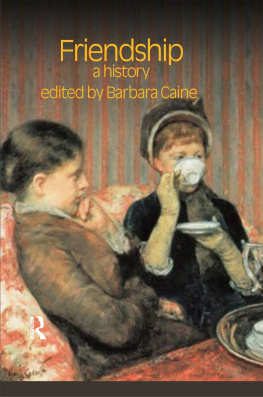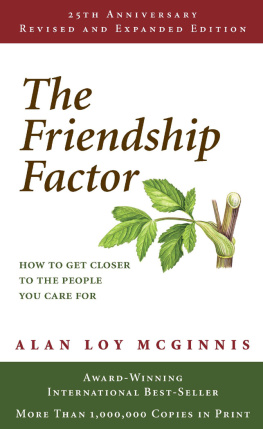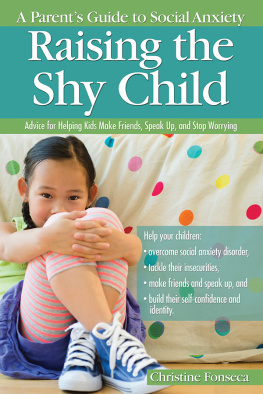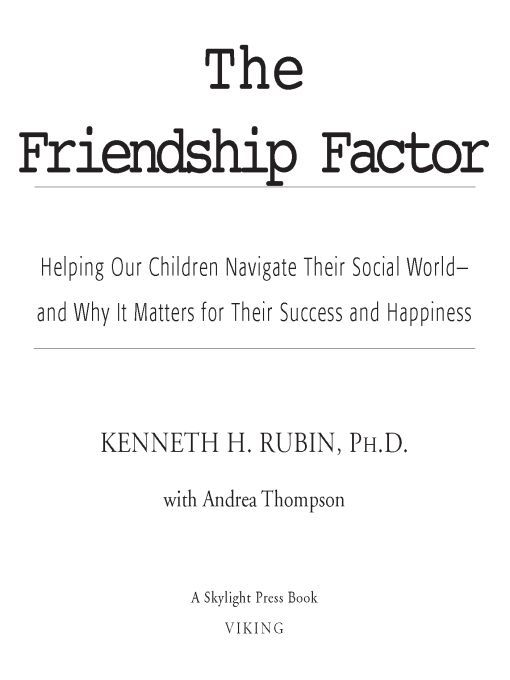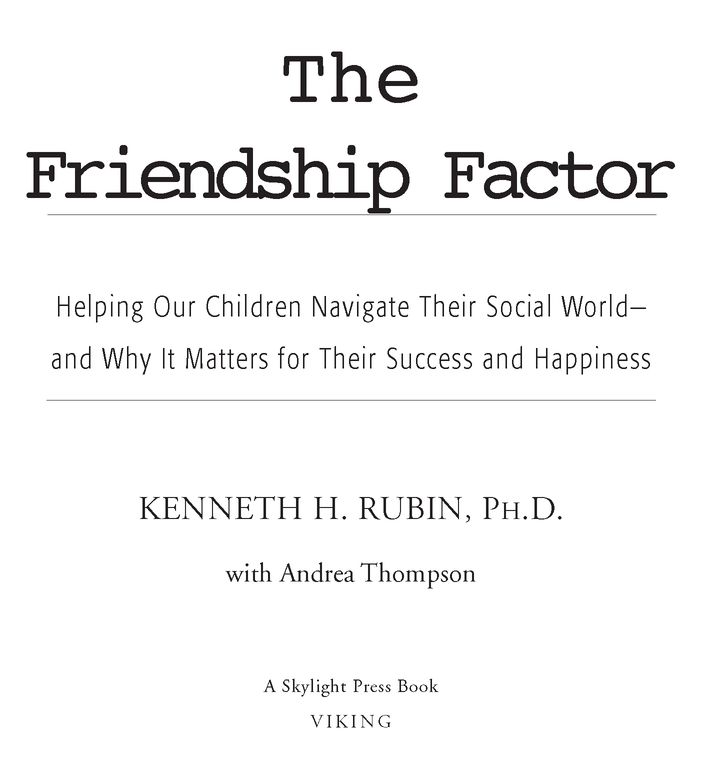Table of Contents
To my parents
Sunny & Jerry Rubin
Acknowledgments
There are many people to whom I am indebted for making this book possible. To begin with, during my thirty-year career as a developmental scientist, Ive had the distinct pleasure of working with a group of stimulating, bright, and highly productive scholars. These friends have shared with me their valuable insights about what makes kids tick, about the importance of peer acceptance and good friendship, and about the very meaning of social competence. At the same time, they have helped me discover what it is that gets kids into trouble with their peers and parentsvaluable information that serves as a guide in prevention and intervention. These colleagues include Linda Rose-Krasnor, Shelley Hymel, Xinyin Chen, Rob Coplan, and Kim Burgess. From Cathryn Booth, Rosemary Mills, and Paul Hastings, Ive learned about the significance of early parent-child attachment relationships, and of parenting beliefs and practices insofar as normal and abnormal social and emotional development are concerned. Thanks to Nathan Fox, I have come to appreciate the power of biology and infant/toddler temperamentthe absolutely alterable foundations for all that follows. My mind would be a muddle if all these conversational partners and research collaborators spoke in independent tongues. My partners and I, after all, have studied a great many diverse topics. But diversity does not mean scattershot independence. The guiding spirit who has, through his elegant writings, allowed me to put all the diverse pieces into a single developmental framework is Robert Hinde.
The backbone for the studies and stories you will find described herein derives, in no small part, from the institutions that have provided my colleagues and me with the financial support to gather our data. These institutions include the National Institute of Mental Health, the National Institute of Child Health and Human Development, the Social Sciences and Humanities Research Council of Canada, and the Ontario Mental Health Foundation. And of course, there would be no data, and no stories to tell, were it not for the dedication and commitment of the children, parents, and teachers who have worked with us over the years.
I am indebted also to Meg Schneider and Lynn Sonberg of Skylight Press for enduring my frequent forays into journal-speak despite our collective goal of creating a readable book for parents. Meg, in particular, made me toe the line throughout the writing process. At Viking Penguin, Janet Goldstein and her capable staff offered highly engaging, helpful, and reinforcing comments. They made me feel that the book in the making was truly meaningfulsomething that scientists dont often hear from their professional colleagues. Of course, this book would not exist without the collaborative spirit of Andrea Thompson. Andrea and I spent countless hours in my office at the University of Maryland. She would ask endless questions and I would do my best to answer them into a tiny, ancient tape recorder. From the questions and answers and from Andreas clear understanding of my professional, jargon-riddled writings came the text of this book. Thank you, thank you, Andrea!
Last, I turn to the Rubin family. I am grateful to Margo for showing me firsthand how and why parenting matters. Anyone who writes otherwise should have lived in our house when our now-adult children were still at home. And I am eternally indebted to Amy Joy and Joshua. They have demonstrated ably that if parents stick with their children through the perturbations of snow, sleet, and thunder that invariably occur, on and off, from childhood through adolescence, the glow of the sun will eventually find its way to warm the parents hearts and spirits. My children are my role models.
Part I
The Friend/Parent Mosaic
Chapter 1
You, Your Child, and Your Childs Friends
What Parents Should Know About Childrens Social Lives
Once upon a time, a childs world of peers tended to be misunderstood, undervalued, or even largely ignored. A generation or two ago, mothers and fathers didnt worry all that much about their childrens social lives. While parents genuinely hoped for the best, as long as a child wasnt getting into fistfights and his school grades stayed decent, the friendships he formed or didnt form were not a matter of great interest. Teachers and other adults who worked with children likewise remained largely silent on the subject of peer relationships.
That picture has changed. Today its not unusual, for example, for a child to be referred for professional help not only because of failing grades or an inability to pay attention in class, but because of bullying and other aggressive behaviors. The gloves are off. Most parents are attuned to subtler indications of social and emotional difficulty as wellrecognizing when a child has few friends or the friendships dont last, or she seems to feel disliked by other kids.
This changing picture is all to the good. From my own experiences in the world of child-development research, I can state unequivocally: Your childs friendships are tremendously significant. At times in the passage from toddler to teenager, his friends may take center stage. More, perhaps, than any other individuals, they will have the power to cause your child to feel truly happy or absolutely miserable; more even than Mom and Dad, your childs friends may be the people he turns to for feedback on how to get through the day.
But friends are critical not only because having them makes life more pleasant. Our research has demonstrated powerful connections between how well a child fares socially and how successful she is in other areas of life. We know, for instance, that
Children, especially good friends, help one another think things through more clearly and competently.
From one another, they learn lessons about whats right and wrong, about loyalty, and about what happens if you hurt someones feelings or betray someones trust.
The better able children are to form good, sustaining friendships and to be accepted and valued within their peer groups, the more apt they are to do well in schooland, in the long run, in life.
So yes, friends do matter; it is appropriate to pay attention to that aspect of your childs growth and development, and to think about what you can do to promote it. From my talks with parents, however, I know that this worthwhile focus can often lead to troublesome thoughts:
When the children in her first-grade class are playing, my daughter seems to be kind of an outsider. I wonder if she does something that turns off other kids.
My daughter is miserable because shes not in the popular clique in her school. I wish I could help her feel better about the whole thing.
My sweet, funny, bright thirteen-year-old hangs out with a group of boys whom I find cocky and obnoxious. He acts that way, too, when hes with them. And I dont like it!
These are typical of comments Ive heard from parents countless times. Perhaps one of them strikes a responsive chord in you, or maybe you have a different worry. I would guess, in any case, that
something about your childs life among other children is causing you grief or at least raising some level of concern:
Why isnt she being invited on more playdates?
Why is he always being teased by other kids?


